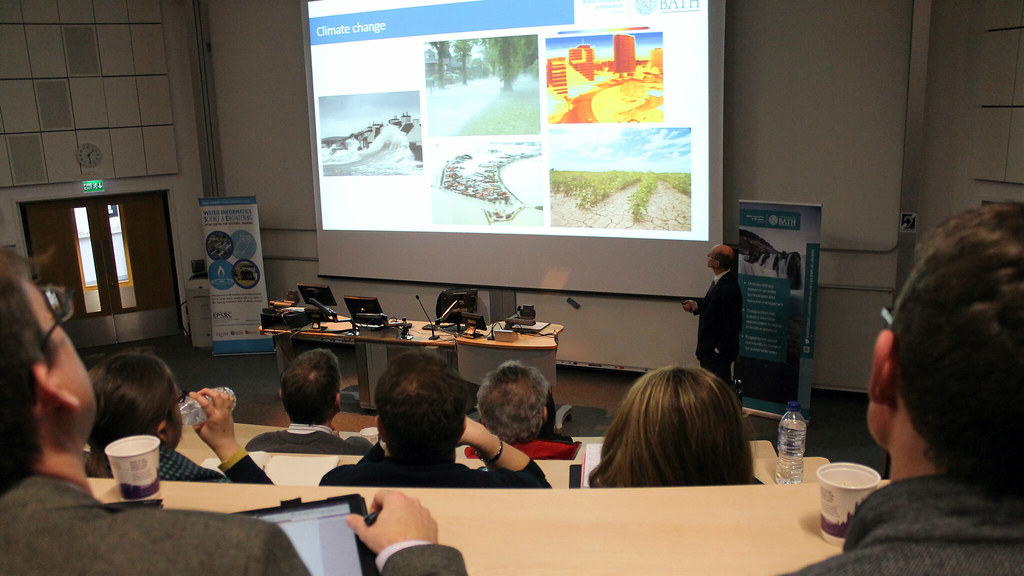Established in October 2014 as a multi-disciplinary water research centre and receiving contributions from researchers across all faculties, departments, schools - as well as with external partners like Wessex Water. The afternoon was opened with a presentation by Professor Jan Hofman, the Director of WIRC who gave insight as to the way in which WIRC is organised as well as to discuss how they work and what the future holds.
Professor Jan Hofman said: “The WIRC Open Day was really successful. I was delighted to see that we could attract new people from outside of the water community. New contacts have been made which offer opportunities for new multi-disciplinary projects. This is exactly the added value of having a water centre on campus.”
Eight research themes were presented during the course of the day and were followed by networking and a Research Fair giving the opportunity for visitors to meet the Theme Leaders and discuss their own project ideas. Each theme will be led by one or two theme leaders and will include a multi-disciplinary research team. The Research theme leaders will take ownership of the development and strategic planning for their theme, together with their theme members.
These plans should be aligned with the three-year reporting obligations to the FRC, where it is important to show the multidisciplinary approach in each theme. From the long-term goals an annual research plan will be derived, which will form the operating document for each theme, and these will be integrated and collated to form the overall strategy for WIRC.
The theme teams will report their progress to the WIRCMB with reference to this annual research plan.
1. Urban Water Management Increasingly people are living in an urban environments - worldwide more than 50 % of the population live in urban areas, and often in big or mega cities. In Europe more than 70 % of the population lives in urban areas.
From this it is obvious that urban water management is an important issue for both water companies and urban planners.
2. Catchment area management Catchment areas are important production assets for water companies, and natural focal points for stakeholders. Catchments are important as resources for drinking water production, but also for agriculture, tourism, nature, and as a living environment. They therefore have an important role in the economy.
This theme will develop novel catchment management principles (e.g. through permitting systems) for water utilities and other stakeholders interested in the whole water cycle, such as citizens and the water regulators, and translate them into use.
3. Water supply from source to tap This theme aims to develop an integrated approach for water resource management, advanced water treatment, and water supply systems, to deliver drinking water in a robust and sustainable manner which complies with modern standards.
It will also include demand forecasting, water supply network design, leakage reduction and prevention, and development of tools for evaluation of the resilience and sustainability of the water supply network in the face of climate change.
4. Waste water collection and treatment Waste water collection and treatment is important to protect the aquatic environment. Wastewater also contains valuable resources (water itself, feedstocks for biofuels & bioplastics, nutrients, metals, etc.) which can be recovered and reused.
In the waste water collection and treatment theme the focus is to develop novel waste water treatment and processing options. This includes rethinking of sewer systems as components of waste water treatment systems, and the development of new treatment technologies for added value recovery and modular development.
5. Water in a circular economy Almost all future visions of sustainability endorse or incorporate the concept of the circular economy. This approach aims to reduce waste production as far as possible, and then to recover waste materials and residuals as a valuable resource. In addition to reducing consumption of natural resources, this approach creates new economic opportunities. Water is a key factor in the circular economy as it is used in many production processes. Moreover, the water cycle is itself an important source of resource, comprising: water, nutrients, and feedstocks for biofuels or bioplastics.
6. Sensors and data Development of robust and reliable sensors for water quality and water quantity is a growing need. Using sensors and data can create new services for customers, can lead to further optimisation of water supply and water treatment systems, and can connect the water sector to the development of the Internet of Things.
This theme is inherently related to all of the other themes. The focus will be on the development of new sensors for water quality and system monitoring. The use of data from these sensors, data transmission and communication, integrated systems in the water cycle, and real time adaption and forecasting are also important.
7. Water awareness and customer behaviour To enhance sustainability and reduce costs it is crucial that people are aware of the role of water and the effect that their water use and habits have on the water environment and therefore management of water resources.
This theme will investigate new ways of influencing domestic and commercial users of water, and of engaging with citizens in partnership to help better manage and sustain local water systems.
8. Coastal/Ocean Engineering Many people live in large urban areas near the coast. This is because the oceans are often a vital resource for society, and because of economic/trading activity, transport systems, access to marine food resources, tourism, and there is now the potential for tidal energy production etc.
This theme will investigate all aspects of coastal water management.

